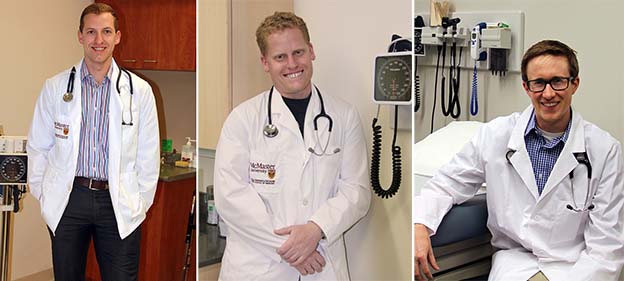Nearly 500 set to graduate from health sciences programs

Steven Hawrylyshyn, Pinhas Ephrat and Colin Yardley are three of the nearly 500 students graduating from health sciences program May 24.
Digital technology, patient-centred care and hometown roots are just some of the things this year’s crop of health sciences graduates say are important to them.
Nearly 500 students will graduate from health sciences programs May 24 at a 2:30 p.m. ceremony in downtown Hamilton.
Stephen Hawrylyshyn will cross the stage twice at the Faculty of Health Sciences’ convocation. He will walk across the Hamilton Place stage once to receive his medical degree, then shake hands a second time while receiving a Master of Science degree in eHealth.
Pinhas Ephrat laughs while remembering being tagged as “the guy who likes to talk to patients” while spending time as a medical student in the intensive care unit at a Niagara region hospital. He likes that distinction, and it’s one he says he will continue to wear proudly as a rural family doctor in the Niagara area in the future.
Kitchener-Waterloo native Colin Yardley was in Grade 9 when he read in the newspaper about plans to build a Waterloo campus of McMaster University’s Michael G. DeGroote School of Medicine. He thought it would be “pretty neat if I ended up there”. He’s now graduating and will be taking his family medicine residency at the same campus.
Matthew Tenenbaum, valedictorian for the Oath Ceremony, would like to become involved in high-end decision-making, such as taking on the role of a health administrator, or becoming a politician. He will stay in Hamilton for residency training in public health and preventive medicine, including family medicine.
They are among the 204 new physicians graduating from the medical school. The Faculty of Health Sciences convocation will see 498 graduates from programs including midwifery, Bachelor of Health Sciences, and several graduate programs cross the stage.
Hawrylyshyn says the value of linking medicine with business became clear to him while studying for his master’s degree.
He is particularly interested in how digital technology can be successfully used in hospital emergency departments to improve the flow of patients. As a family medicine resident at Toronto’s St. Michael’s Hospital starting in July, he feels he will be able to improve these skills by having access to the hospital’s knowledge institute and family physicians recognized for innovative use of technology to improve patient care.
For Pinhas Ephrat, spending time with patients and learning their issues, concerns, strengths and weaknesses are what family medicine offers him with its holistic approach to care, he said. He is scheduled to remain at the Niagara Regional Campus of the Michael G. DeGroote School of Medicine for his two-year residency in family medicine. After that, he plans to set up practice in Fort Erie.
Colin Yardley plans to also take additional training in emergency medicine along with his family medicine residency at the Centre for Family Medicine which is a teaching centre for the Waterloo medical campus. Rather than going outside his home community for his residency, Colin wanted to start giving back.
He’s already started. In his first year in medical school in 2011, Yardley and fellow student, Alexandra Choi, founded MACgic Bus, a program which introduces Grade 5 students in Kitchener to medical education by inviting them to the campus.
Matthew Tenenbaum once thought he would become an anesthesiologist, preparing patients for surgery and spending days in the operating room. In what seems like a complete turn-around, he plans to become a family doctor advocating for better patient care and improved health care policies.
His believes his career choice is a good fit for him. “I came in thinking that learning the bulk of medical knowledge would be the focus. I realized the bigger focus is to be drawn into the medical culture – it’s not so much what you learn but how you apply it, not just becoming a competent clinician but engaging effectively with the health system, medical education and services,” he says.
Also at the convocation, Elaine Carty, a nurse, midwife and one of Canada’s leading pioneers on women’s health issues, will receive an honorary Doctor of Sciences degree. The founding director of the midwifery program at the University of British Columbia helped introduce midwifery into the Canadian health care system.
Two winners of the University President’s Awards will also be given accolades at the convocation ceremony. Bruce Wainman, director of the Anatomy Education Program and associate professor of the Department of Obstetrics and Gynecology will receive a President’s Award for Outstanding Contribution to Teaching and Learning, and Bachelor of Health Sciences student Lauren Salci will receive a President’s Award of Excellence in Student Leadership.


